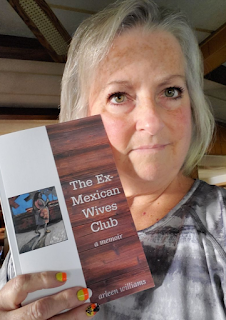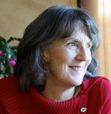Arleen Williams's Blog, page 4
February 19, 2021
COVID & Creativity

This was my day: I woke at 6 am and dozed for another hour. The first upright hour, I wasted on my cell – email, news, social media. I watched a Roy Orbison and KD Lang duet, started a load of laundry, then decided I needed to hear more KD Lang. I spent another hour or two listening to music, researching Canadian songwriters - Leonardo Cohen, Gordon Lightfoot, Joni Mitchell, Neil Young, Jane Siberry, Sarah McLachlan, Leon Redbone (a rabbit hole of talent) – while reading about inspiration and creativity.
The reading was inspired by this wonderful video clip my friend, Veronique Burke, shared of the work she’s created during this pandemic year. It got me wondering about how little I’ve been writing and the reasons for that change. Then I made chocolate chip banana bread, cleaned out the refrigerator and made a shopping list. If not for the falling rain, melting snow and slushy sidewalks, I might have walked to the store, or driven. Instead, I folded laundry before sitting down to finish Isabel Wilkerson’s masterpiece, The Warmth of Other Suns – The Epic Story of America’s Great Migration.
Finally, after numerous additional texts with sisters and friends, I sat and scribbled a draft of this post with Veronique’s video of looping through my brain. Veronique’s creativity explodes in image, paper mache and mosaic. It’s clear that she had a blast expressing herself and decorating her world. I admire that, and I’m grateful to her for the reminder that self-expression can do wonders for the soul and that creativity doesn’t bloom on its own but grows through regular attention, a practice that’s easy to lose during these endless months of isolation.
How are you expressing your creativity these days?
January 20, 2021
Hope in Portland?
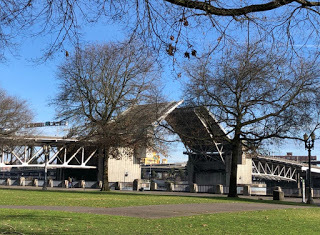 Portland, Oregon is a city of memories. A quirky, friendly, fun city. A place for back-to-school shopping trips with my daughter and romantic getaways with my husband. Built on the Willamette River, it reminds me a bit of Paris or London, with parks and paths along both banks and crossed by numerous bridges. Ten days after the insurrection in D.C., my husband needed to make the three-hour drive from Seattle to Portland for business. I decided to tag along, and we booked a room in one of Portland’s historic downtown hotels. We assumed the low rates were pandemic related. After checking in and parking the car in the garage – for us walking or cycling is the best way to enjoy Portland – we headed toward the river and soon discovered that Portland is no longer the City of Roses I have long loved.
Portland, Oregon is a city of memories. A quirky, friendly, fun city. A place for back-to-school shopping trips with my daughter and romantic getaways with my husband. Built on the Willamette River, it reminds me a bit of Paris or London, with parks and paths along both banks and crossed by numerous bridges. Ten days after the insurrection in D.C., my husband needed to make the three-hour drive from Seattle to Portland for business. I decided to tag along, and we booked a room in one of Portland’s historic downtown hotels. We assumed the low rates were pandemic related. After checking in and parking the car in the garage – for us walking or cycling is the best way to enjoy Portland – we headed toward the river and soon discovered that Portland is no longer the City of Roses I have long loved.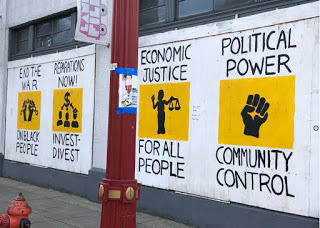
Last summer’s peaceful Black Lives Matter demonstrations in response to the May 25th murder of George Floyd turned violent when white supremacists, anarchists, and Trump supporters converged on the city. When federal agents were called in, violence escalated. It is still smoldering.
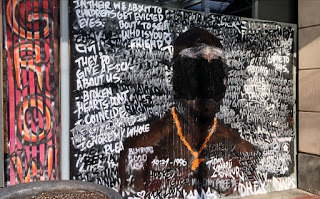 That violence combined with the financial crisis caused by the pandemic has left a wasteland of boarded up buildings. Some stores are open for limited business with entrances through reinforced doors. A few restaurants offer outdoor dining, but most we saw offer take-out only or remain closed. Chain link fences surround official buildings, monuments, and parks. Homeless people, tents and garbage are visible at every turn.
That violence combined with the financial crisis caused by the pandemic has left a wasteland of boarded up buildings. Some stores are open for limited business with entrances through reinforced doors. A few restaurants offer outdoor dining, but most we saw offer take-out only or remain closed. Chain link fences surround official buildings, monuments, and parks. Homeless people, tents and garbage are visible at every turn.
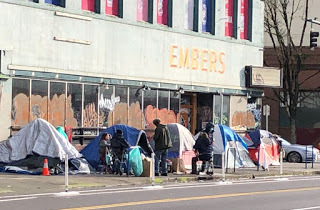 We headed toward Portland’s famous food trucks for a late lunch. There are several areas we have enjoyed on prior visits. This time we found them amid seas of homeless encampments. After being approached a few times for handouts, we opted to move on.
We headed toward Portland’s famous food trucks for a late lunch. There are several areas we have enjoyed on prior visits. This time we found them amid seas of homeless encampments. After being approached a few times for handouts, we opted to move on. Walking away, we saw police activity: police vehicles with flashing lights barricading the street, officers holding pointed guns over cruiser roofs, a pedestrian filming with her cell. But the pain is in pockets. We found another cluster of food trucks only a few blocks away and we ate.
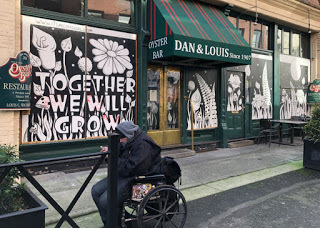
Everywhere the buildings are boarded up. Many are framed with two-by-fours, as though for a new wall. This allows easy removal and replacement of plywood boards. A necessity in an unstable environment. I was reminded of the roll-down metal security doors I became familiar with during my years in Mexico City. According to the desk clerk at our hotel, these barriers have come down and been replaced several times in the past eight months. She said some were removed last autumn only to be replaced before the presidential election. Some were removed after the election only to be replaced in response to the January 6 attack on the U.S. Capitol. Now the city seems to be waiting, holding its breath, for the inauguration.
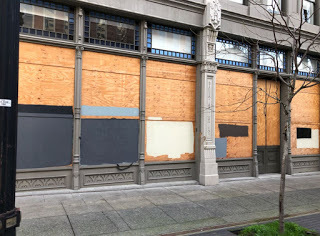
Some of the plywood boards are painted, others are raw wood. Many have splotches of different colored paint as though nobody could settle on a color choice. Those splotches testify to a constant battle by some to stop the graffiti. The boards on other buildings display creative and artistic expression. The Apple store boasts large black panels and invitation to folks to decorate them. They remain untouched.
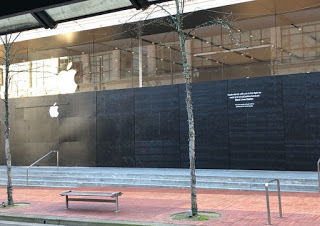
That evening in our comfortable hotel room with take-out from a nearby grocery store, we watched Anand Giridharas on MSNBC’s The Last Word with Lawrence O’Donnell. He described what we are experiencing in America today as the beginning of something new and better for our unique nation.
Anand Giridharadas, publisher of The.Ink, says that what the country experienced last week is the chaos at the end of white supremacy. “This is not a launch party, this is a funeral for something. It is a funeral for white supremacy. It is a funeral for a kind of outdated, outmoded male power. It is a mourning for a time in which certain Americans could claim to be the default of America and not have to share.” (Source)
Here's an excerpt from an essay Giridharadas published in The.Ink:
We are falling on our face because we are jumping very high right now. We are trying to do something that does not work in theory. To be a country of all the world, a country made up of all the countries, a country without a center of identity, without a default idea of what a human being is or looks like, without a shared religious belief, without a shared language that is people's first language at home. And what we're trying to do is awesome. It is literally awesome in the correct sense of that word. (Source)
While it is hard to imagine Portland’s downtown returning to peace and prosperity from such extremes of unrest and poverty, I find hope in Giridharadas’ words.
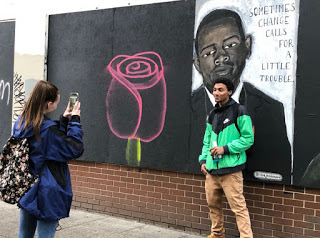
December 17, 2020
Yesterday I Cancelled Thanksgiving in Passager's Pandemic Diaries

Diary, journal, morning pages - like many I write (almost) daily to record my thoughts and observations. Sometimes that writing finds its way into a book or poem or blog piece. Sometimes it remains scribbles in a notebook. This year started no differently. Then the pandemic hit in March and I started typing everything and saving it by month in a desktop file labeled COVID Diary.
Three months later my grandson was born. I began to imagine the comments this little boy may receive throughout his life when he mentions his birthdate. When I found myself addressing my writing to him, I renamed the file - The Year You Were Born.
A friend gifted me a copy of Passager, a collection of the 2019 poetry contest winners and I learned of their call for submissions to the Passager's Pandemic Diaries. I'm pleased to share that a piece I wrote about cancelling our Thanksgiving dinner plans was included.
Please CLICK HERE to read the many wonderful journal entries included and consider submitting your own.
December 7, 2020
Scheduling for Sanity
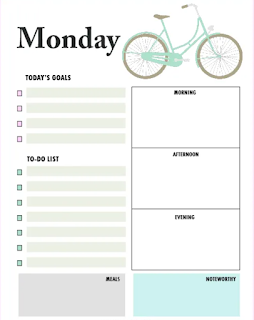
As I embark on retirement, I am pleased to settle into a schedule that ensures my personal essentials for a rewarding life – family and friends, reading and writing, and physical activity.
I now have a schedule that I admit is not self-imposed but structured around my daughter and son-in-law’s childcare needs. Two days each week are dedicated to my grandson. Two days of absolute joy and total exhaustion. Two days that include two or three hours of pushing a stroller up and down the West Seattle hills. I call him my personal trainer – the lull of the stroller overcoming his refusal to nap spurs me on.
So exercise overlaps with family time, as it does with friend time on other days of cycling or walking. On lousy wet Seattle days, cycling becomes a solitary indoor activity with my bike in a trainer. But still, I try to exercise daily. To keep my sanity.
Though most days writing is a solitary activity, I’m fortunate to share the writing habit with friends a couple of days each week. Hours are spent writing together in silence, sharing newly drafted work, discussing craft and more. The love of words and storytelling, of self-expression and creativity bind us together.
My life is full even during this time of COVID isolation, even as I make this shift from a lifetime of work to one of retirement, but creating a weekly schedule and a daily To Do list definitely helps. Not a rigid schedule, not a schedule with no wiggle room, but still a schedule that ensures family and friends, reading and writing, and exercise are all a part of each day.
Are you working from home? Are you retired? How does scheduling your time work best for you?

November 16, 2020
Facebook Memory
Around the time of that last publication, a writer friend asked what was next. I confessed I was tired, that maybe I needed a break, maybe I’d try poetry for a while. Something different. Something I knew nothing about. But what I’ve discovered or maybe what I’ve known all along is that I’m a book person – fiction, nonfiction, memoir – but book length. Something that pulls me into a different world and holds me there. I’m currently reading a collection of wonderful short stories by Langston Hughes titled The Ways of White Folks, and I find I want each story to continue. I’m greedy for more. I can’t move from one to the next with ease. As with stories and essays, I find it hard to read a book of poems from cover to cover. So the accumulation of collections scatter throughout my small home for quick visits at random moments throughout the day when I’ve lost track of what it was I was doing.
When I read, I want to be pulled into a world of characters and events. When I write, I want the same. I want to see the story in my head, eyes closed. I want to know the bookends, beginning and end. I want to get to know the characters, watch them develop. I usually don’t know how everyone will get from beginning to end, but I know where they’re headed. It’s not unusual for surprises to arise, for the bookends to shift, for characters to take unintended paths. The planned ending and the changes that appear along the journey create a pull, a tug to the table, to the pen and paper, that keep me writing, keep me in the story for the months, the years it can take to create even the first draft of a book-length manuscript.
So where am I now? With a notebook of draft poems and the start of a novel manuscript that requires in-person research – impossible during the pandemic. This time of COVID has no bookends, and the writer in me is floundering. So my apologies, Cindy, but the next book will be slow in coming. Blame it on the pandemic.
November 3, 2020
What Country Will My Grandson Know?
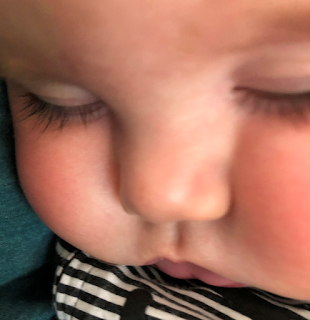
According to Webster’s Seventh New Collegiate Dictionary, anxiety refers to “a painful or apprehensive uneasiness of mind usu. over an impending or anticipated ill.”
The online Oxford Languages Dictionary defines anxiety as “a feeling of worry, nervousness, or unease, typically about an imminent event or something with an uncertain outcome.”
Anxiety affects each of us in unique ways. For me, it feels like someone has slugged me in the stomach, knocking the air out of me and leaving lingering pain for days. It is physical, but also “of mind.” Take last night. I was awake for hours, my thoughts churning.
2020 has provided plenty of “uncertain outcome(s)” from the pandemic to politics. Anxiety slithers through our terrors and pain with absolute abandon. The “impending or anticipated ill” of our shared future feeding the hungry snake.
The pandemic began with my first experience in online teaching in March and unexpected retirement in September. It began with intense concern for my pregnant daughter’s well-being and the premature birth of my grandson in June as social justice activists marched below their hospital window. Now retirement allows me to provide childcare for this grandson as my daughter returns to work at Harborview ER on the eve of another projected spike in COVID infections.
As I scribble these thoughts, people across this vast country are standing in long lines for the opportunity to practice their constitutional right to cast their vote. The outcome is still uncertain, and anxiety remains unabated. The result of this election will determine the direction of our country.
October 9, 2020
Retirement? Now?
I had not planned on retiring yet. Not this year. Not next. I taught at an urban college for 33 years. 35 seemed like a good number. Two more years to take that serious look at our "financial future" and "potential healthcare costs." Something my husband and I have never given much attention.
Besides, who in their right mind retires during an international pandemic? Who walks away from a secure tenured professorship in the midst of the worst national unrest since the mid-1800s? Who abandons financial security on the cusp of an election that will shape the future of our world as we know it?
Apparently, I do.
The District, consisting of three colleges including the one where I spent half my life, is in serious financial crisis. Rather than downsizing the top-heavy administration or reducing the inflated salaries of the chancellor, his ten vice chancellors and three presidents, they opted to reduce the tenured teaching staff. Inflated you ask? The chancellor makes $303K, thirty percent more than our state governor. Besides, reducing tenured faculty allows greater flexibility for future adjunct faculty layoffs.
But don’t get me wrong. I wasn’t forced to retire. None of us were (on my campus alone, nine tenured faculty have opted to leave). We were offered a tenure buyout (50% of 2020-2021 salary) with five weeks to make the decision and complete the retirement process. I cannot speak for the other eight, but I couldn’t teach for a year knowing that if I stayed home, I’d still receive half my salary.
I will miss my students and all they taught me. I will miss having the opportunity to develop my online teaching skills this academic year with an eye toward building a hybrid English language program for immigrants and refugees when the campus eventually reopens. And I will miss participating in campus-wide efforts to create a truly antiracist environment.
But I am now retired. My head is spinning, and I am still trying to figure out how to structure my days. I have cycling and hiking, reading and writing, despite COVID. And best of all, by some inexplicable gift of synchronicity, my unexpected retirement coincides with the end of my daughter’s family leave and an offer she received to work dayshift. So, as she returns to Harborview ER, the joy of spending time with this little guy a few days each week will be all mine. How wonderful is that?!
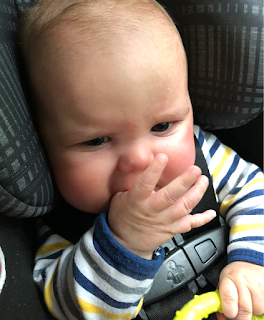
August 18, 2020
When Empathy is Not Enough
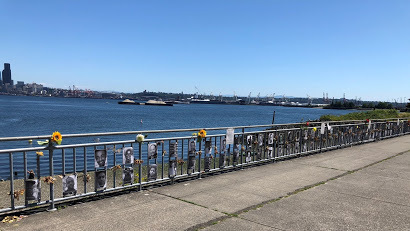
At least once a week, maybe twice I cycle or walk Beach Drive in West Seattle. Every time I pass this memorial at Seacrest Park it gives me pause, brings tears to my eyes. I am often pulled to a stop by an invisible thread, to see, to read, to honor the dead.
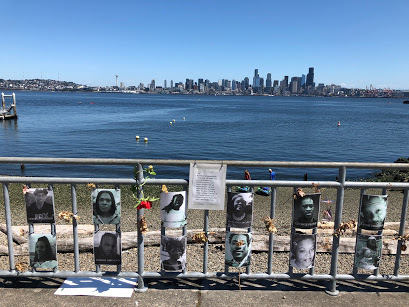 I do not know who created this memorial or even when. I do not know who periodically adds photos or changes the flowers. It does not matter. What I do know is that I photographed it on July 20. A month ago I took dozens of photos I never posted. So why now?
I do not know who created this memorial or even when. I do not know who periodically adds photos or changes the flowers. It does not matter. What I do know is that I photographed it on July 20. A month ago I took dozens of photos I never posted. So why now? I was inspired by Michelle Obama’s words last night at the Democratic National Convention, by her challenge to move our empathy to action, action that will move our country toward a racially just home for all:
... it is up to us to add our voices and our votes to the course of history, echoing heroes like John Lewis who said, “When you see something that is not right, you must say something. You must do something.” That is the truest form of empathy: not just feeling, but doing; not just for ourselves or our kids, but for everyone, for all our kids.
These photos in my phone have been a painful personalreminder of injustice, of violence, of hatred. But I have used my empathy for nothing. I have done nothing. Now, I share a few of them with a plea to vote, to request your ballot now and to vote early.I do not know if a new president can alone change the direction our country has taken for the past four years, but I do know that we cannot survive another four years on the same crash course we are on now. A course of racist and sexist violence and a denial of science that has led to over a 160,000 COVID deaths, a number that continues to grow.
As I stare into the eyes of my tiny White grandson, I want a better country, a more just world for him and for all the babies – Brown, Black and White – born during this time of COVID-19, of economic insecurity, of racial injustice.
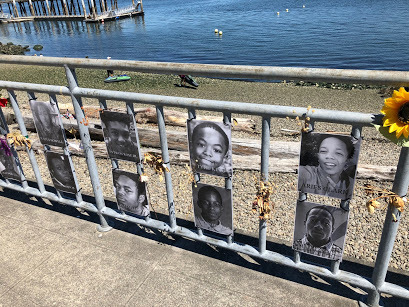
These 186 people, young and old, were murdered. Some for their political voice. Most for simply being in the wrong place at the wrong time. All for the color of their skin.
This is not the country I want my grandson to inherit, a country with a long history of systematic racism. We must do better, be better. We must elect representatives who will listen, who will acknowledge and change the racist policies continuing to shape our country. Four hundred years of racist policies.
I believe my vote matters. I believe your vote matters.
I believe we can change if we listen beyond the headlines, if we read our history from all voices, if we question the beliefs held by the dominate White culture.
I believe we must change, if not for ourselves, for our children. For our grandchildren.
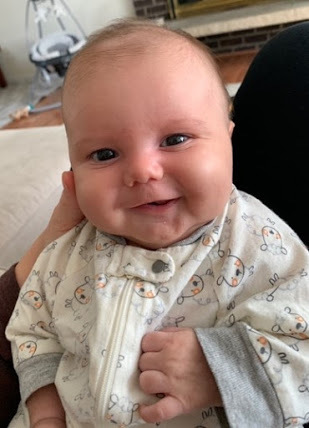
July 31, 2020
So Very Much to Learn
The Pacific Northwest summer soothes with days of rain and sun, of gray and brilliance. Yet this summer is unlike any other of my long teaching career. I am not basking in a period of rejuvenation, of cycling, of writing. Of simply enjoying my first grandchild. Instead it is a summer of COVID isolation and social unrest.
It is a summer of change, and for me a time of intense study. I cannot totally disconnect from work because there is too much happening. So, I attend a few remote meetings each week, and I struggle to educate myself in order to understand the violence that fills our streets and the discord that questions the lack of social justice in the lives of my students, in the workings of my college, and in the structure my country.
I continue to work through my summer reading list, adding more titles as I go along. Earlier this spring, during my months of vision problems, I learned the joy of listening to audio books. Even though I can read again, I have continued the practice of listening, so I’m working through that list more quickly than I expected. So far, I’ve read:
So You Want to Talk About Race, Ijeoma OluoThe New Jim Crow, Michelle Alexander Heavy , Kiese Laymon They Can’t Kill Us All , Wesley Lowery Me and White Supremacy , Layla F. SaadDisgruntled, Asali SolomonThe Fire Next Time, James Baldwin
If Beale Street Could Talk, James Baldwin
Currently I’m reading How to be an Antiracist by Ibram X. Kendi and Race, Empire,and English Language Teaching by Suhanthie Motha while listening to White Fragility by Robin DiAngelo (despite, or perhaps because of, John McWhorter’s critic “The Dehumanizing Condescension of White Fragility” in The Atlantic, July 15, 2020).
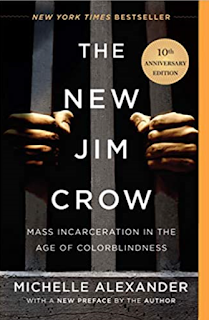 What have I garnered from all this reading? I’ll own that my understanding of the racial justice movement in America faded after Civil Rights. More recent events have made me aware of my ignorance of systematic racism. I decided to try to understand what has gone wrong, or rather what has always been wrong, for so many people in this country. I have found all of these books interesting in one way or another, but the most helpful of those I have dipped into so far is probably Michelle Alexander’s 2010 study of the War on Drugs and mass incarceration in America since the early 1970s.
What have I garnered from all this reading? I’ll own that my understanding of the racial justice movement in America faded after Civil Rights. More recent events have made me aware of my ignorance of systematic racism. I decided to try to understand what has gone wrong, or rather what has always been wrong, for so many people in this country. I have found all of these books interesting in one way or another, but the most helpful of those I have dipped into so far is probably Michelle Alexander’s 2010 study of the War on Drugs and mass incarceration in America since the early 1970s. Digging a bit deeper online, I learned that during a 1994 interview, Nixon’s domestic policy chief, John Ehrlichman was quoted as saying “the Nixon campaign had two enemies: ‘the antiwar left and black people.’” He then went on to explain “‘We couldn’t make it illegal to be either against the war or black, but by getting the public to associate the hippies with marijuana and blacks with heroin, and criminalizing both heavily, we could disrupt those communities. We could arrest their leaders, raid their homes, break up their meetings, and vilify them night after night on the evening news. Did we know we were lying about the drugs? Of course, we did.’”
A few days ago, I came across the same quote on page 25 of Ibram X. Kendi’s How to be an Antiracist. It warrants repetition: “President Richard Nixon announced his war on drugs in 1971 to devastate his harshest critics--Black and anti-war activists. ‘We could arrest their leaders, raid their homes, break up their meetings, and vilify them night after night on the evening news,’ Nixon’s domestic policy chief, John Ehrlichman, told a Harper’s reporter years later. ‘Did we know we were lying about the drugs? Of course we did.’”
So began the war on drugs, the results of which are still being felt almost fifty years later. According to the Pew Research Center, while overall imprisonment rates have declined since 2007, “In 2017, there were 1,549 black prisoners for every 100,000 black adults – nearly six times the imprisonment rate for whites (272 per 100,000) and nearly double the rate for Hispanics (823 per 100,000).”
According to Prison Legal News, “In 2010, the percentage of all Americans with a felony record was 8.11 percent (including three percent who have served time in prison), but for black males the rate was 33 percent (including 15 percent who have been to prison). Additionally, while the absolute number of people with felony convictions increased threefold between 1980 and 2010, it increased fivefold for blacks during that time.”
On June 11, 2020 ABC News posted an article titled “ABC News analysis of police arrests nationwide reveals stark racial disparity” stating “In an analysis of arrest data thousands of police departments voluntarily reported to the FBI, in 800 jurisdictions, black people were arrested at a rate five times higher than white people in 2018.”
Mass incarceration – America’s latest form of legal segregation – is the new Jim Crow of Michelle Alexander’s book title, but how can this be legal? What about Constitutional rights?
A few days ago, when my husband shared a HuffPost article titled “The Supreme Court Built America’s Broken Policing System And It’s Working Just As Intended,” more pieces of the confusing puzzle of systematic racism began to fall into place for me. It is a long, detailed article, by Paul Blumenthal which begins:
“Police and the politicians who protect them get most of the attention in the movement to defund or reform law enforcement. But there’s another, more powerful force that’s allowed law enforcement to use force on citizens, stop them without a warrant, lock them up for minor crimes and even raid their homes without a knock.
The Supreme Court has spent the last 50 years affirming the power of police to legally take such actions. The system built by officials and sanctioned by the court isn’t broken; it’s working just as intended.”
I feel my rosy colored glasses shattering. I have lived a life of guilt and empathy, aware that my white skin gives me privilege and security others do not have. Still, I have been blind to the depth of systematic racism, inequity, and violence surrounding me every day. The fact that I got through eighteen years of American education having never been introduced to James Baldwin speaks volumes. I still have so very much to learn.
July 17, 2020
A Reading Event in the Time of COVID
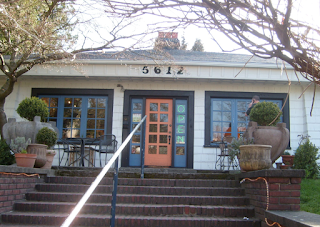 Since February 2010 a small neighborhood coffee house in West Seattle called C&P Coffee has hosted monthly readings by poets and other storytellers under the stewardship of Leopoldo Sequel. On the fourth Wednesday of every month these events have showcased two featured readers followed by community mic - an opportunity for any and all to share their work.
Since February 2010 a small neighborhood coffee house in West Seattle called C&P Coffee has hosted monthly readings by poets and other storytellers under the stewardship of Leopoldo Sequel. On the fourth Wednesday of every month these events have showcased two featured readers followed by community mic - an opportunity for any and all to share their work.This community event, dubbed PoetryBridge, flourished for ten wonderful years, and I was honored to have participated a number of times both as featured reader and as an open mic-er testing out new material. With time, came structure and a new website. The 10th Anniversary celebration was scheduled earlier this year, and I was looking forward to reading in March.
Then COVID-19 hit.
I've since learned that Leopoldo is not a man easily stopped. In April, he took PoetryBridge online with weekly Zoom readings, monthly gatherings feeling insufficient during these stressful times. Curating a weekly reading event is no easy task, and I am grateful to him for all his hard work.
I am very pleased to invite you to the next PoetryBridge Zoom event on Wednesday, July 22 at 7:00 pm. I'm excited to be sharing the featured reading slots with the talented writer and teacher, Priscilla Long.
If you are interested in becoming a regular PoetryBridge community member and receiving weekly updates and invitations, just go the website and follow the instructions.
If you'd rather try it out first, I will have the Zoom link on Wednesday and am happy to share it with you. Just email me soon at aw@arleenwilliams.com, so I can best facilitate a mailing.

